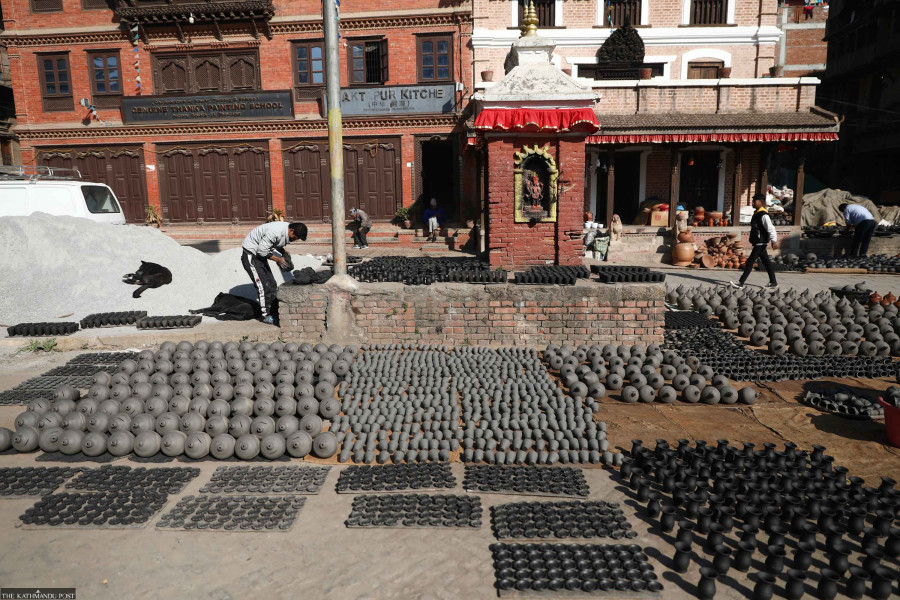Money
One-third of small businesses rely on inheritance for initial capital
Access to bank credit remains limited with just 16 percent of them going to banks and financial institutions, ADB report says.
Krishana Prasain
The major source of initial financing for micro, small and medium-sized enterprises (MSMEs) in Nepal comes from inheritance, ancestral properties and income and savings, a recent report shows.
According to the report entitled Small and Medium-Sized Enterprise Monitor published by the Asian Development Bank, 33.1 percent of MSMEs are using inheritance wealth or ancestral properties while 25.8 percent are using income and savings for initial financing for their business.
Access to bank credit remains limited for MSMEs with just 16 percent of them going to banks and financial institutions.
MSMEs largely supply domestic markets, and as many are unregistered and informal, formalising and connecting them to international markets would boost national productivity, the report said.
About 85 percent of workers in Nepal are informal. The majority of MSMEs are engaged in services and operate in rural areas in the region; only a few cater to international markets, although their impact on exports varies by country.
The report shows that the other sources of initial financing for MSMEs are informal credit (8 percent), remittance income (6.8 percent), cooperatives (5.9 percent) and venture capital (0.5 percent).
To improve access to finance, the government and central bank provide several soft loan programmes, a mandatory lending scheme (5 percent of loan portfolios are allocated to target groups such as MSMEs), refinancing facilities and consulting services.
Umesh Prasad Singh, acting president of the Federation of Nepalese Cottage and Small Scale Industries, told the Post that the government announces provisions but they never get implemented.
“The complex procedure of banks discourages many MSME entrepreneurs from obtaining bank loan services,” Singh said. He added that those having connections with bank managers get loans more easily.
“Others face difficulty getting loans. That is why people are ready to sell their ancestral property instead of going to banks and financial institutions to get a loan,” he added.
Nepal Rastra Bank requires commercial banks to provide 40 percent of their loans to agriculture (15 percent by July-end 2023), energy and tourism (10 percent by July-end 2024), and MSMEs (15 percent by July-end 2024).
MSME lending is defined as loans below Rs10 million. Similarly, development banks must issue 20 percent and finance companies 15 percent of their loans to these sectors by 2023.
The central bank also requires banks and financial institutions to provide other types of concessional lending. They are required to lend at least 5 percent of their portfolio to groups such as women, small farmers, craftsmen and ethnic minorities, with loans up to Rs500,000.
“Despite the government providing credit facilities to MSMEs, entrepreneurs going to banks make up only 16 percent as given in the report, which shows that entrepreneurs do not want to go to them. This shows access to bank credit remains limited for MSMEs,” Singh said.
"The government has a provision to provide loans of up to Rs1.5 million without collateral for MSMEs, but banks ask for collateral even to provide credit of Rs1 million," he said. "Banks are not willing to provide even Rs500,000 due to the liquidity crisis."
The central bank also offers refinancing for businesses including MSMEs with banks and financial institutions refinancing up to Rs1 million at 3 percent interest, lower than the 8.6 percent average.
Many MSMEs have benefited from foreign investment.
As of 2019-20, 4,213 small firms had received approval for foreign investment, or 83.4 percent of all firms with foreign investment. Also, 10.4 percent of medium-sized firms and 6.2 percent of large enterprises attracted foreign investment.
However, the amount of foreign investment per entity is much lower for MSMEs than large firms. On average, a large enterprise received Rs661.5 million, a medium-sized firm received Rs98.9 million, and a small enterprise received Rs17.4 million
As of 2019-20, according to the report, 314 large scale industries had received foreign investment amounting to Rs207.72 billion.
The report said that MSMEs provide employment to 453,195 people.
The challenges for the development of MSMEs are lack of an entrepreneurial culture, inadequate identification of target groups, inability to link training with industries, need to get the Challenge Fund operational and insufficient funds for start-ups, according to the report.
The inability to harness opportunities created by globalisation and new technologies is also challenging for the development of MSMEs, it said.
MSMEs contribute 22 percent of Nepal's GDP. However, almost half of all business establishments are unregistered, and more than 90 percent of workers working in MSMEs with fewer than 10 workers have informal employee relationships as per the Central Bureau of Statistics.
MSME contributions to the economy are not recorded in formal statistics and their impacts are not fully reflected in any analysis. Thus, according to the report, the pandemic’s impact on MSMEs hurt the economy well beyond data officially released.




 11.12°C Kathmandu
11.12°C Kathmandu














